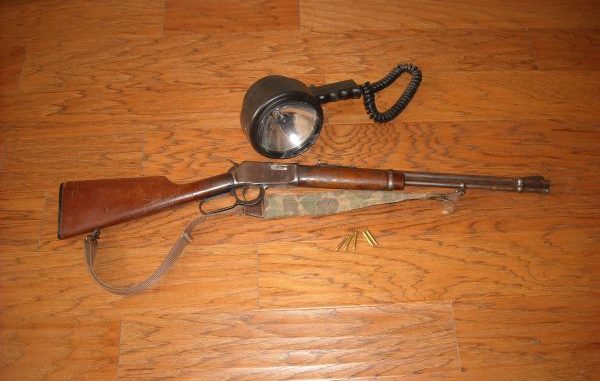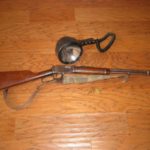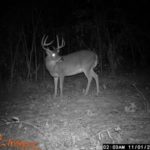
Some illegal hunters are hard to shut down
One of the more memorable cases I recall working was during the mid-80s in Rapides Parish. It all started when the LDWF district lieutenant received a call from a state police narcotics officer in early September. The state trooper was working undercover and had established a relationship with two men who were dealing small amounts of illegal narcotics.
The undercover officer told our district lieutenant that, in addition to the small-time drug transactions, these two suspects were poaching and selling deer. In fact, they were putting far more effort into poaching, hunting several nights a week and killing significant numbers of deer. Neither poacher held a steady job, but they were deriving a decent income from the poaching trade.
Jack and Howard are not their real names, but we’ll use those for the story. We learned that Jack and Howard, along with their wives, were sharing a house in a rural area in eastern Rapides Parish.
The undercover agent said Jack had a Jeep complete with lift kit and aggressive mud tires. The Jeep was equipped with a police scanner, spotlights and bolt cutters. Locked gates and fences were no object, and Jack and Howard were not shy about entering private property.
We had some good information, but then the bad news; Jack and Howard ranged far and wide. They roamed Rapides, LaSalle, Winn and Grant parishes at will, and held to no schedule or pattern.
We knew nothing about Howard, but Jack was no stranger. He had a poacher reputation, and had been born and raised in Rapides.
The lieutenant had a pretty good idea where Jack usually hunted, so we focused on those areas initially. Jack’s usual haunts could not sustain the level of damage he was inflicting, but it was a place to start and we reasoned he would return to familiar ground from time to time.
This was in the days before cell phones, and we relied on two-way radios for communication. Knowing about the scanner, we stayed off the radio as much as possible and used code names for roads and locations when we had to talk.
Our district included Rapides and Avoyelles parishes, so agents from both parishes were working the case. We thought everyone had been briefed about the police scanner, along with receiving instructions from the lieutenant to stick with code.
But apparently one agent did not get the word.
That agent was working surveillance late one night when he saw the distinctive close-set headlights of a Jeep and heard the hum of big mud tires on asphalt approaching on the road he was watching. The Jeep slowed and turned in at a gated road leading to an area of woods and crop fields.
The agent picked up the microphone and reported he was watching a Jeep headed into the woods off McKeithan Drive (the real name of the road). The Jeep instantly reversed out onto the road and took off.
So much for one night’s work.
Our random surveillance work continued night after night while the undercover trooper continued to report numerous illegal deer kills all through September. Not much other enforcement work was getting done, and the regular hunting seasons — our busiest time of year — were rapidly approaching.
We needed arrests on Jack and Howard, and were brainstorming for a way to get it done.
It occurred to us that all these deer had to be skinned somewhere, so we asked the undercover if he could find out if the poached deer were all taken to a single location and, if so, where. He was able to determine the majority of deer were taken to the house Jack and Howard shared.
We decided to try surveillance on the house, hoping for better luck.
It was now early October, and one afternoon brought a good rain followed by cool air from an approaching early cold front. The lieutenant called four of us to meet him a little after dark. He had a plan.
The group consisted of Lt. Charlie Wiley and Agents Burton Wiley, Joe Lemoine, Ronald Hill and me. Lt. Wiley’s plan was for Hill and me to approach the rear of Jack and Howard’s house through the woods and set up surveillance.
The lieutenant, Burton and Lemoine would wait with two vehicles at a concealed location nearby. If things worked as planned, Jack and Howard would take advantage of the ideal weather and go hunting. If they returned home with illegal deer, we would close in and make the arrests.
Hill and I slipped through the woods, came up behind the house and looked things over. The house had a carport area under roof with a dim light. Lights were on in the house, and there sat the jacked-up Jeep backed into the carport, nose pointed up the driveway toward the road. It was around 10 p.m., still early, and Hill and I thought they were either not going to hunt this night or would go later.
It was not long before we saw movement in the house, and Jack and Howard came out onto the carport. We were thinking they were about to take off on an illegal night hunt when we got quite a surprise. They dropped the tailgate on the Jeep and began dragging deer out, dumping them on the carport floor.
Not one, not two, not three, but five deer.
They hung one deer from the ceiling of the carport and began skinning under the dim light.
Hill stayed on watch while I hustled back to the waiting agents and delivered the news. Lt. Wiley decided to return with me to the rear of the house to cover any attempt to escape into the woods by Jack and/or Howard.
Burton and Lemoine would give us enough time to get into position before taking the two patrol vehicles and coming up the driveway, blocking any attempt to escape using the Jeep.
It went perfectly. When the two patrol trucks with lights flashing entered the driveway, Jack grabbed the partially skinned deer, and both he and Howard started running for the woods behind the house. Hill, Wiley and I stepped out loudly identifying ourselves and blocking the way.
Jack and Howard gave up without any problem. We were glad because Jack was one big boy!
In addition to the five deer, we found un-tagged and illegal alligator hides on the carport. They were seized, along with the .22 magnum rifle used to take the deer. We arrested Jack and Howard, and brought them up to the Rapides Parish Jail for booking, interviews and paperwork.
Interviews with suspects willing to talk are fascinating.
Howard did not have much to say, but Jack was a different story. He was fairly forthcoming in admitting to night hunting and poaching. Jack even described the effectiveness of the .22 magnum on deer, explaining proper shot placement to avoid crippling and loss. He was one of those guys hard not to like. He was pleasant and polite, and held no personal resentment toward us. His attitude was, “Hey, I knew I was doing wrong, and you caught me. No hard feelings.”
This case went to trial, although I never really understood why. The evidence was overwhelming, and Jack and Howard did not strike me as being able to afford attorney fees. They were found guilty. In addition to the fines, the judge ordered the infamous Jeep confiscated.
I never had occasion to run across Jack or Howard again. But several years later I received a call from a man in Mississippi. The man said he was managing some hunting property in Mississippi and had just hired Jack to work on the place.
The Mississippian had talked with the sheriff of Rapides Parish about it, and the sheriff told him he might want to speak with me about Jack.
After I got the laughing under control, I told the man Jack would do a good job. But if he ever noticed Jack carrying around a .22 magnum, look into how he was spending his nights.




